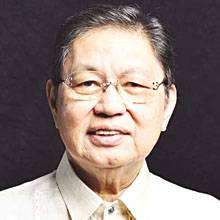THE LEGAL FRONT

When I reflect on my high school years, gratitude is the first thought that comes to mind, for the unique lessons and experiences that served me well throughout my life. High school coincides with the transition from boyhood to manhood, from the years under parental care and carefree play, to the years of independence and responsibility. Intellectually, these are the formative years when the mind is slowly stretched and shaped by lessons in literacy, numeracy, spirituality, and discipline, that would further be honed and expanded during college and later years. I thank the Jesuits for the lasting lessons they provided in these formative years under their unique ratio studiorum system of teaching and studies.
Fr. Raymond Miller, S.J. introduced us in our first year to Latin which we then heard by reputation to be the magical language of priests. He started us on the most basic – the routine terra-terrae-terrae recital of Latin declensions, to the verbal laudo-laudas-laudat conjugations.
With Latin, coupled with the push toward early religiosity through our Sanctuary Society, we became active mass participants who became familiar with the “Introibo Ad Altare Dei” and the “Ad Deum qui laetificat juventutem meam” response, that started the Latin mass we came to know and love. Weekly confessions and communion became a way of life, rounded off by outside activities on spirituality in the Sodality of our Lady and teaching of catechism in the ACIL.
I profited from Latin all the way to law school and law practice; Latin terms suffuse the law and to know them, even slightly, was a distinct advantage: I no longer struggled to remember the meaning of Latin terms such as res adjudicata and res gestae. Latin immeasurably helped, too, in vocabulary building. I really felt sad when I later learned that Latin was no longer in the curriculum when my son’s turn to be in high school came.
Fr. Miller, together with Fr. Benjamin Carlos, S.J., gave us our first lessons in English and pushed us into love of reading through the CEAP Book of Short Stories that we read and re-read. We loved the story of Naughty Ned and Willing Walter who exemplified what we could be in the paths of life we would choose.
Our early English lessons were followed and supplemented in our third year by exposure to renowned English writers; Fr. John Mayer, S.J. bombarded our days with assignments and recitals of the works of literary giants. Fr. Mayer’s dramatic readings of “The Raven,” demonstrated how terror could drive a poet to eloquence; we identified “Annabelle Lee” with our early teenage “crushes.” Like Poe, we wished that they would live with no other thought than our love.
Fr. Kyran Egan, S.J. exposed us during our senior year to English composition writing, through imitation paragraph exercises; he gave us model paragraphs and required us to compose our own with these models as templates. Soon, we learned how to compose on our own, based on our own original thoughts and remembrance of past readings and experiences.
Fr. John Chambers S.J. was our first year Algebra teacher. I credit him with removing childhood dread for mathematics and numbers, by showing us that mathematics is not a magic known only to a few; it follows a logic that, once known, renders it within the easy reach of everyone who aspires to know.
The discipline we came to know bordered on the stern, as administered by Fr. Gervacio Unson, S.J. who was our dean of discipline. In this capacity, he administered the school’s rules-based penalty system that imposed penalties for violations of the school rules. The main penalties were the “jug” and the “post.” Beyond these were suspension and expulsion for graver offenses.
The jug required us to copy, after class, a designated number of pages of written materials. This is seemingly a painless task, but pain invariably sets in through the stiffening of our backs, hands, and fingers, and the thought that we were missing our much-awaited after-class basketball games.
Post required us to walk around the school quadrangle with a rifle on our shoulders for an hour or two after classes. Aside from the physical exertion, this is again a denial of our after-class participation and playing time in our favorite intramural sports – basketball and volleyball. This was a painful experience that a few of us once continuously endured for several days, even during class hours, because we had been suspended for “taking back” our Christmas package drive contributions: we refused to accept that we lost in the Christmas Package Drive contest because medical supplies were given more contest points, than money.
Fr. Unson was also personally memorable because he directed our school play. In my first year, it was Julius Caesar where I played the role of Portia, the wife of Brutus. It was not an easy role to play at a time when gender rules were unforgiving; nobody liked to be identified as effeminate. I endured the interminable teasing and even began to enjoy my role once I had mastered my lines and the mode of delivery.
Those were glorious and unforgettable golden days I shall always treasure. But I am not closing this column on this note. I bothered to write about my half-a-century-old high school days for a more important reason – Vice President (and Secretary of Education) Sara’s Matatag curriculum. I hope my memories – which I know I share with many Jesuit school graduates, perhaps even with the Vice President’s father – would somehow serve as examples, for better or for worse, in the evolution of our curriculum from what it had been during our time, to what it is now, and to what it would be for our children. ([email protected])